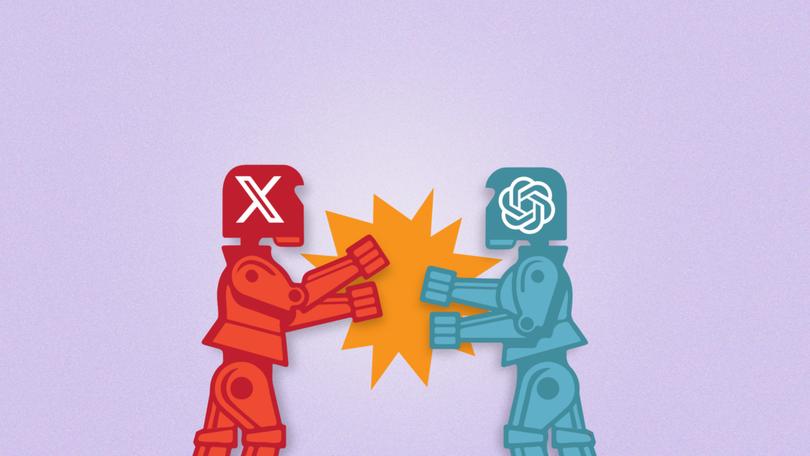THE ECONOMIST: Elon Musk’s xAI goes after Sam Altman’s OpenAI
The battle between xAI and Sam Altman’s OpenAI should be robust corporate competition. But Elon Musk could be turning it into a knife fight.

An underappreciated force behind great technological change is intense — and petty — rivalry.
In the “war of the currents” in the late 19th century, Thomas Edison electrocuted stray animals to discredit Nikola Tesla. A century later Steve Jobs traded insults with Bill Gates during a battle between Apple and Microsoft.
Even “Silicon Valley,” a satirical HBO series, starts with a feud — and the priceless quip: “These are billionaires, Richard. Humiliating each other is worth more to them than we will make in a lifetime.”
Sign up to The Nightly's newsletters.
Get the first look at the digital newspaper, curated daily stories and breaking headlines delivered to your inbox.
By continuing you agree to our Terms and Privacy Policy.In the world of generative artificial intelligence (AI), the scrap between Elon Musk and Sam Altman is in the same league. It is both silly and captivating. Silly because they insult each other, try to discredit each other’s chatbots and fight over who meant what almost a decade ago when they co-founded OpenAI.
Captivating because, fuelled by grievance, Mr Musk has created xAI, maker of a series of large language models (LLMs) called Grok. It has its sights set on OpenAI, now run by Mr Altman, which became wildly successful with the release of ChatGPT two years ago. While OpenAI was last valued at $US157 billion ($242b), xAI, which is less than two years old, is already reported to be worth $US50b.
xAI is desperate to catch up. In September it fired up the world’s biggest supercomputer in Memphis, built in record time with 100,000 of Nvidia’s graphics processing units (GPUs), at an estimated cost of $US4.5b.
Mr Musk promised to double the size within a few months. xAI is raising money hand over fist: $US5b in its current round, according to the Wall Street Journal, on top of $US6b in May (OpenAI has raised $US6.6b this year).
The cash and computing power will help train the third generation of Grok, which Mr Musk, with his usual rambunctiousness, has promised will be “the world’s most powerful AI by every metric”. Time is of the essence: as ChatGPT showed, the first model to display a superior level of intelligence can leave the rest in the dust.
Mr Musk’s AI company has other advantages. The man attracts brilliant engineers; xAI recruits from the top LLM labs as well as from Tesla, his electric-vehicle maker.
The LLMs are partly trained on data from X, Mr Musk’s social-media platform, which (for all its toxicity) provides up-to-the-minute information.
xAI stands to benefit from familial ties with Tesla and SpaceX, Mr Musk’s rocket-and-satellite firm. Both generate valuable data on the real world: Tesla via the cameras that it hopes will support fully autonomous driving, and SpaceX via its view from space.
Though some investors resent the way Mr Musk takes from one company to give to another, he argues that xAI will ultimately help him realise his dream of creating autonomous cars, “robotaxis” and humanoid robots. Such ambitions may help xAI get its hands on scarce GPUs because Jensen Huang, Nvidia’s boss, shares Mr Musk’s sense of higher purpose.
“What Elon is doing is so cutting-edge. Jensen loves that,” says Umesh Padval of Thomvest Ventures, a venture-capital (VC) firm.
Yet compared with OpenAI, xAI is still an underdog. OpenAI’s partnership with Microsoft — though strained at times — gives it access to infrastructure not even the world’s richest man can match: Microsoft’s capital expenditures, mostly on GPUs and data centres, are expected to exceed $US150b in 2024-25.
Combining the products it sells directly to its customers with those sold via Microsoft gives OpenAI a roughly 70 per cent share of the LLM market. That is still a big lead.
The risk is that Mr Musk turns what should be robust corporate competition into a knife fight. Earlier in November he filed an amended lawsuit — the third version this year — against OpenAI and its backers, with xAI as a plaintiff and Microsoft as a defendant for the first time.
It repeats accusations that Mr Altman and his co-defendants abandoned a non-profit, safety-first mission, partly funded by Mr Musk, in order to get rich. OpenAI disputes this. The suit’s latest allegations are that OpenAI and Microsoft hobbled competition by restricting OpenAI’s investors from putting money into AI rivals and through what it calls a de facto merger.
In January the Federal Trade Commission, an antitrust body, launched an inquiry into Microsoft’s ties with OpenAI, as part of a broad look at AI investments. Some OpenAI investors fear that Mr Musk could use his influence with President-elect Donald Trump to encourage the FTC to dig deeper.
One of those investors, Alexandre Azoulay of SGH Capital, a VC firm, accuses Mr Musk of using “lawfare” against OpenAI rather than fair competition. But for its part, OpenAI’s defensive strategy veers worryingly near to wrapping the company in the flag. One person close to OpenAI portrays it as a champion in America’s tech war with China.
Its innovation is “foundational to US success—not just economic competitiveness but who prevails between the US and China,” he says.
In fact, America’s technological edge would be best served by both firms slugging it out in the marketplace, not by either of them pulling political and geopolitical strings. In the meantime, all the elements are in place for a blockbuster remake of “Silicon Valley” for the AI era.
